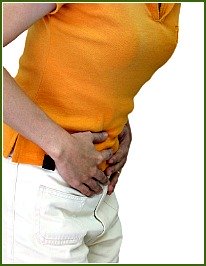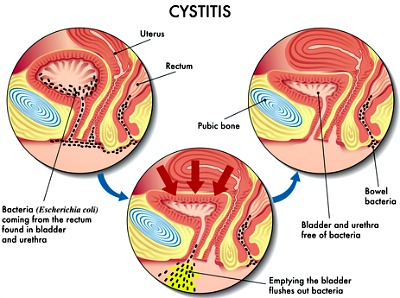Lower Abdominal And Back Pain
Causes And How To Treat It In Men, Women & During Pregnancy
"A 30-year-old man presented with lower abdominal and back pain, nausea, vomiting, and a significant weight loss", reports the journal, Archives of Pathology & Laboratory Medicine, December 2004.

Further testing revealed the cause of his lower back ache and abdominal pain to be due to a tumour in his pancreas.
That is not the typical cause of lower abdominal and back pain in majority of the time. Abdominal pain that spreads to the lower back is quite a very common condition. Common causes include menstrual pain, pelvic inflammatory disease, fibroid, miscarriage, ligament pain in middle and late pregnancy, cystitis, ovarian cyst, endometriosis and womb and ovarian tumor, in women.
In men, the common causes include cystitis, prostatitis, discitis, chance fracture, psoas abscess, pancreatic tumor and abdominal aortic aneurysm.
In pregnancy causes of lower abdominal pain and back pain would include miscarriage, ligament pain, cytitis, placenta abruptio, and labour pain.
What might be causing your lower abdominal and back pain? Let's now discuss each of these causes in different settings and how to work out what might be causing the pain, as well as treatment options possible.
Common Causes Of Lower Abdominal And Back Pain In Men & Women
The following are the common causes of lower abdominal and back pain in both sexes. They could also cause lower abdominal and back pain during pregnancy, and in children.
Lower abdominal pain that spreads to the back is not a condition that is commonly seen in men. There are indeed very few conditions that could bring about this type of symptom in males, making their diagnosis reasonably easy to diagnose. They include:
1. Cystitis

Cystitis is the medical word for bladder infection. The bladder lies in the lowermost part of the abdomen. It receives and stores urine from both kidneys every minute. Once your bladder contain about 400mls or more of urine, it sends signals to your brain and you feel the sensation to pass urine.
A normal adult feels this sensation and goes to pass urine between three to eight times in a day, depending on a lot of factors, including your bladder capacity and social factors.
Bacteria from the rectum often get their way into the bladder. This happens frequently in women than in men, because of their very short urethra - about 3cm only, connecting their bladder to the outside world. At other times, bacteria could get into the bladder by other means.
If the bladder is not emptied often due to not drinking enough water, or dehydration in hot climates, or for any other reasons, these bugs fester and grow in the bladder, causing bladder infection or cystitis.
The symptoms of cystitis in both men and women are about the same. They include:
- Increase in the frequency of passing urine
- Burning or stinging sensation when passing urine
- Feeling tired, exhausted and drained
- Feeling of nausea, loss of appetite and in severe cases, vomiting
- There may be lower abdominal pain below the level of the belly button or umbilicus around the bikini line in front
- The abdominal pain may spread to the lower back and sometimes to one side in the upper back, if the kidney on that side is also infected
- There may be blood in the urine
- There may also be fever - high temperature
- Cystitis or urine infection is a common cause of acute confusion and irrational behaviour in the elderly.
If you or your loved one suffers with lower abdominal and back pain with a number of the above symptoms, it is most likely that they are suffering with cystitis or urine infection.
Treatment of cystitis is best achieved by:
- Use of antibiotics. Commonly prescribed adult dose of cystitis antibiotics include Trimethoprim, 200mg Twice Daily or Nitrofurantoin, 50mg Four Times Daily or Augumentin (contains penicillin), 625mg Three Times Daily, or Ciprofloxacin 500mg Twice Daily, or Cefalexin 500mg Three Times Daily. If you have allergy to penicillin, avoid Augmentin and Cephalexin. Use antibiotic for 5 to 7 days.
- Drink a lot of clear fluid, preferably pure water, 2 to 6 litres in a day, depending on local temperature and humidity.
- Drink Cranberry juice. It contains special ingredients that makes it difficult for bacteria to attach themselves to the wall of the bladder, causing infection.
- Cleaning from front backwards, when using a toilet paper after using the toilet, to prevent bringing feces to the front and into the urethra inadvertently.
2. Acute Retention of Urine
Acute retention of urine occurs when there is bladder obstruction, leading to the inability to pass urine freely.
This is a common cause of lower abdominal pain and back ache in men, more than in women. This condition affects elderly men more than anyone else. It is due to enlarged prostate in over 8 out of ten cases.
It can also occur in women.
Causes of acute retention of urine include:
- Prostate enlargement in men only
- Severe cystitis
- Constipation
- Spinal cord compression
- Multiple sclerosis (MS)
The Symptoms of Acute Retention of Urine include:
- Sudden inability to pass urine with lower abdominal pain and inability to stay still
- Lower abdominal and back ache
- Feeling of wanting to pass urine but only passage of very little amount of urine
- Progressive distension of the lower abdomen
- Pain worsening with every passing hour until help is obtained
Treatment of Acute Urine Retention is by:
- The passage of a urine catheter to empty the bladder.
- Antibiotics and medications like oxybutynin may be required to help improve flow if infection and prostrate problems are suspected respectively.
3. Irritable Bowel Syndrome (IBS)



